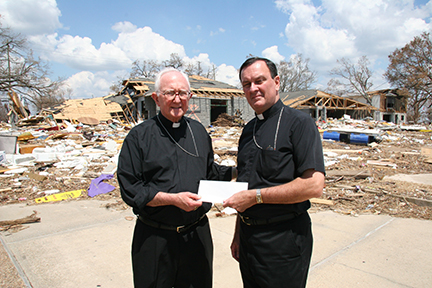From the Archives
By Mary Woodward
Recently, I assisted in setting up for the Bishop’s Ball, Catholic Charities’ annual fundraiser. This year the event was held at the Two Mississippi Museums in Jackson, a wonderful complex featuring the state’s history from prehistoric times to the present, and a whole building devoted to the civil rights movement.
During a break from setting up, I went upstairs to view a special exhibit on Hurricane Katrina. Aug. 28 marks the 20th anniversary of the catastrophic storm that claimed more than 1,800 lives and caused more than $125 billion in property damage. The exhibit was a collection of photographer Melody Golding’s work enlarged for the space and various items salvaged from the storm that are part of the Mississippi Archives and History Collection.

Also included were displays of facts and figures and one interesting list of “Things We Learned.” On this list were simple realizations such as: “We can all ride in one car”; “A bag of ice is better than a sack of gold”; “Any brand of coffee will do”; and “Your neighbor is part of the family.”
Thinking back to 20 years ago as we approach the anniversary, I remember all the moving parts the diocese and Catholic Charities coordinated in the aftermath of that devastating storm. I remember all the hotels and shelters in Jackson being filled with Gulf Coast refugees fleeing the path. I remember taking blankets, pillows and Bibles to the Coliseum in downtown Jackson, which was serving as a shelter and was unprepared for the number of people who arrived.
I remember watching the helicopter flyover of the Coast on my battery-operated mini TV the morning after the storm and thinking, this is not real. I remember dragging a 10-foot turret from the cathedral’s steeple into the bishops’ burial ground to keep it safe from copper thieves.
I remember making a trip down to the Coast a few months after the storm with Bishop William Houck, who was then serving as president of Catholic Extension in Chicago. He was bringing prayers, greetings and a check to the Diocese of Biloxi, which suffered immense damage from the tidal surge, flooding and winds of Katrina.
There are so many memories that the entire World Wide Web could not hold them. As I was preparing for this column, I went through some of the old press releases we had done as part of the ongoing disaster recovery plan – one that came together on the fly because no one ever expected something such as Katrina.
Here is one of those releases that shows the many moving parts mentioned above:
Catholic Diocese of Jackson/Catholic Charities Jackson
September 2005
Schools:
- The diocesan Catholic school system has taken in 585 displaced students.
- Parents have not been charged enrollment fees or tuition.
- Schools, through community outreach, are providing uniforms, school supplies and backpacks free of charge.
- We have established a Diocesan Katrina Relief Education Fund to assist schools incurring additional expenses to serve displaced students.
Rural areas:
- Catholic Charities and the Diocese of Jackson have “adopted” the rural areas around Hattiesburg in the Diocese of Biloxi.
- Facilitated with St. Thomas Catholic Church in Hattiesburg for the church to become a FEMA distribution site.
- Diverted many trucks with emergency supplies to this site for distribution.
- Provided a mobile truck to deliver supplies to rural communities.
- Helped Purvis set up a FEMA site.
- Currently serving hard-hit small communities including Foxworth, Columbia, Bassfield, Sumrall, Seminary, Mize, Moselle, Eastabuchie, Richton and Laurel.
Jackson distribution warehouses:
- 40 Boling Street: The state of Mississippi under Gov. Haley Barbour has taken control of this site, which was previously coordinated by the Seventh-day Adventists and Catholic Charities. Ships sorted bulk, palletized items only.
- 1425 Ridgeway Street: The state has asked Catholic Charities to coordinate this second warehouse to take unsorted goods, sort and palletize them, and ship them to Boling Street for distribution to needy areas.
- Ellis Avenue: We have our own warehouse with funds donated by the Knights of Malta to store items such as school supplies temporarily so they may be sent to our newly bulging schools.
Parish efforts:
- Shelters for evacuees as well as power company workers.
- Pastoral visits to shelters.
- Provided laundry service to shelters.
- Mass was offered at the Coliseum shelter for Catholics staying there.
- Parish dinners and breakfasts have been taken to shelters, and people in shelters have been brought to the churches for Mass and hospitality.
- Surveying temporary housing options.
- Emergency food pantries set up.
- Helping individuals and families set up homes with supplies.
- Assisting evacuees still in hotels with food and rent assistance.
- Hosting relief volunteers in private homes of parishioners.
As I read through this list, I remember how well everyone worked together under incredibly difficult circumstances. Tempers did flare at times because it was very hot and there was no power for weeks, even as far north as Jackson, but those flare-ups were met with understanding and forgiveness.
Collectively, we remembered that “we can all ride in one car.”
(Mary Woodward is Chancellor and Archivist for the Diocese of Jackson.)
